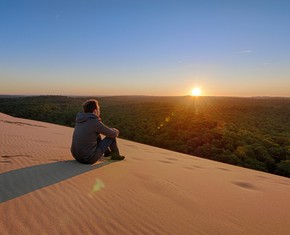The views expressed in our content reflect individual perspectives and do not represent the authoritative views of the Baha'i Faith.
I’m used to concrete, convenience, noisy streets, sirens, police, and the general busy nature that characterizes most cities.
Though obviously smaller than LA, Chicago, or New York, growing up in Minneapolis made me a city girl.
In Minneapolis I grew used to the fast pace of life and the ease of living in close proximity to others that a city provides. The noise of cars passing through my busy street became white noise that lulled me to sleep for a nap, and the density of the population made me feel safe— for me, emptiness actually feels scarier than a neighborhood with a “bad” reputation. I’ve always felt that if something went tragically wrong, at least if I screamed in the city someone would hear me.
As a kid I drew a distinct line between life in nature and my life in the city. Within the spectrum of girly girl-ness and tom-boyish ways I was landed somewhere on the side of being girly. I thought bugs were gross, hated sports, and when it was cold I opted to make bookmarks in the library in lieu of spending time outside.
As you might imagine, when my mom signed my sisters and I up for an urban farming day camp program I was far from excited. Youth Farm and Market Project gives kids living in the city the unique opportunity to learn how to farm in urban settings, sell produce, and hone a variety of other useful talents. Years later, looking back I realize this was a pretty awesome program, but as a 12-year-old kid, though I thought the friends I made were pretty cool, I felt averse to being outside for such long periods of time.
As a part of this program, once every summer we went to farm camp. We packed our backpacks, loaded up on buses, and drove out to rural Minnesota or Wisconsin to stay at a real large-scale farm. Farm camp exposed all of us kids to a completely different way of life that existed only a couple of hours from the city world we knew. I remember enjoying the experience, but also enjoying our return to the city. One year I remember coming back, and dramatically kissing the concrete to demonstrate to those around me how ecstatic I was to be back in what I viewed as the “civilized world.”
By the time I moved to New York I realized I missed the green nature of the city of Minneapolis. I started to feel pangs of withdrawal from the nature I had been surrounded by while I lived there. Even though 10-year-old Makeena might have never believed it, now I actually work to find intentional ways to build the outdoors into my life, since I live in New York’s concrete jungle.
Zooming out, however, this craving to be close to greenery and water is no shock. Studies have shown the mental and physical health benefits of spending time in nature, but as I’ve realized how magnetic its pull is I’ve come to wonder—does its impact supersede mental and physical health? Does nature have a spiritual impact?
Many spiritual traditions and practices rely on this premise. As humans we are intrinsically connected to the natural world around us. The Baha’i teachings point out that “nature is God’s Will and its expression:”
Nature in its essence is the embodiment of My Name, the Maker, the Creator. Its manifestations are diversified by varying causes, and in this diversity there are signs for men of discernment. Nature is God’s Will and is its expression in and through the contingent world. It is a dispensation of Providence ordained by the Ordainer, the All-Wise. – Baha’u’llah, Tablets of Baha’u’llah, p. 142.
When we sit mindfully within nature, we begin to understand the symbols for deeper internal virtues evident there. The sun imbues radiance, joy, and universal warmth. It reminds us of our interconnectedness with populations on other sides of the planet. The moon reflects its light, which reminds those of us who recognize human goodness as a reflection of God’s radiance, so that we can reflect divine beauty the way the moon does the light of the sun. A flower garden can represent how diversity is beautiful in unity. The many different plants and flowers of a garden are gorgeous individually—but even more so together.
This reflection leads to other questions for me about preserving our precious environment—the space where we can refresh ourselves not only mentally, physically, but also spiritually—and the place that sustains all human life. How can we better honor our environment and remove greed from the way we interact with it?
This question, so pressing and real, has become more and more important as we increasingly come to realize the power that nature has to move and soothe humanity.
















Comments
Sign in or create an account
Continue with Googleor